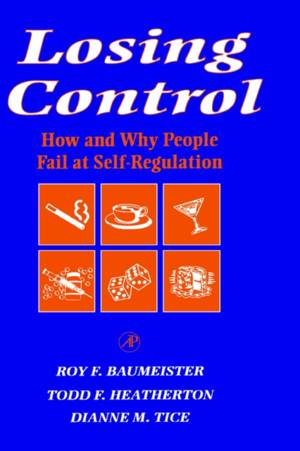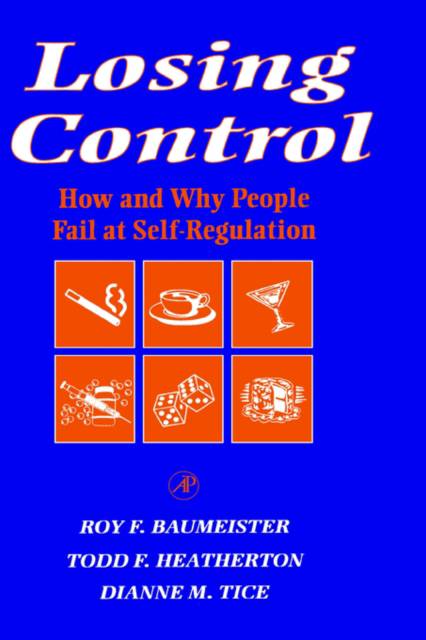
Bedankt voor het vertrouwen het afgelopen jaar! Om jou te bedanken bieden we GRATIS verzending (in België) aan op alles gedurende de hele maand januari.
- Afhalen na 1 uur in een winkel met voorraad
- In januari gratis thuislevering in België
- Ruim aanbod met 7 miljoen producten
Bedankt voor het vertrouwen het afgelopen jaar! Om jou te bedanken bieden we GRATIS verzending (in België) aan op alles gedurende de hele maand januari.
- Afhalen na 1 uur in een winkel met voorraad
- In januari gratis thuislevering in België
- Ruim aanbod met 7 miljoen producten
Zoeken
Losing Control
How and Why People Fail at Self-Regulation
Roy F Baumeister, Todd F Heatherton, Dianne M Tice
Hardcover | Engels
€ 74,45
+ 148 punten
Omschrijving
Self-regulation refers to the self's ability to control its own thoughts, emotions, and actions. Through self-regulation, we consciously control how much we eat, whether we give in to impulse, task performance, obsessive thoughts, and even the extent to which we allow ourselves recognition of our emotions. This work provides a synthesis and overview of recent and long-standing research findings of what is known of the successes and failures of self-regulation.
People the world over suffer from the inability to control their finances, their weight, their emotions, their craving for drugs, their sexual impulses, and more. The United States in particular is regarded by some observers as a society addicted to addiction. Therapy and support groups have proliferated not only for alcoholics and drug abusers but for all kinds of impulse control, from gambling to eating chocolate. Common to all of these disorders is a failure of self-regulation, otherwise known as "self-control."
The consequences of these self-control problems go beyond individuals to affect family members and society at large. In Losing Control, the authors provide a single reference source with comprehensive information on general patterns of self-regulation failure across contexts, research findings on specific self-control disorders, and commentary on the clinical and social aspects of self-regulation failure. Self-control is discussed in relation to what the "self" is, and the cognitive, motivational, and emotional factors that impinge on one's ability to control one's "self."
People the world over suffer from the inability to control their finances, their weight, their emotions, their craving for drugs, their sexual impulses, and more. The United States in particular is regarded by some observers as a society addicted to addiction. Therapy and support groups have proliferated not only for alcoholics and drug abusers but for all kinds of impulse control, from gambling to eating chocolate. Common to all of these disorders is a failure of self-regulation, otherwise known as "self-control."
The consequences of these self-control problems go beyond individuals to affect family members and society at large. In Losing Control, the authors provide a single reference source with comprehensive information on general patterns of self-regulation failure across contexts, research findings on specific self-control disorders, and commentary on the clinical and social aspects of self-regulation failure. Self-control is discussed in relation to what the "self" is, and the cognitive, motivational, and emotional factors that impinge on one's ability to control one's "self."
Specificaties
Betrokkenen
- Auteur(s):
- Uitgeverij:
Inhoud
- Aantal bladzijden:
- 322
- Taal:
- Engels
Eigenschappen
- Productcode (EAN):
- 9780120831401
- Verschijningsdatum:
- 7/11/1994
- Uitvoering:
- Hardcover
- Formaat:
- Genaaid
- Afmetingen:
- 158 mm x 238 mm
- Gewicht:
- 585 g

Alleen bij Standaard Boekhandel
+ 148 punten op je klantenkaart van Standaard Boekhandel
Beoordelingen
We publiceren alleen reviews die voldoen aan de voorwaarden voor reviews. Bekijk onze voorwaarden voor reviews.









